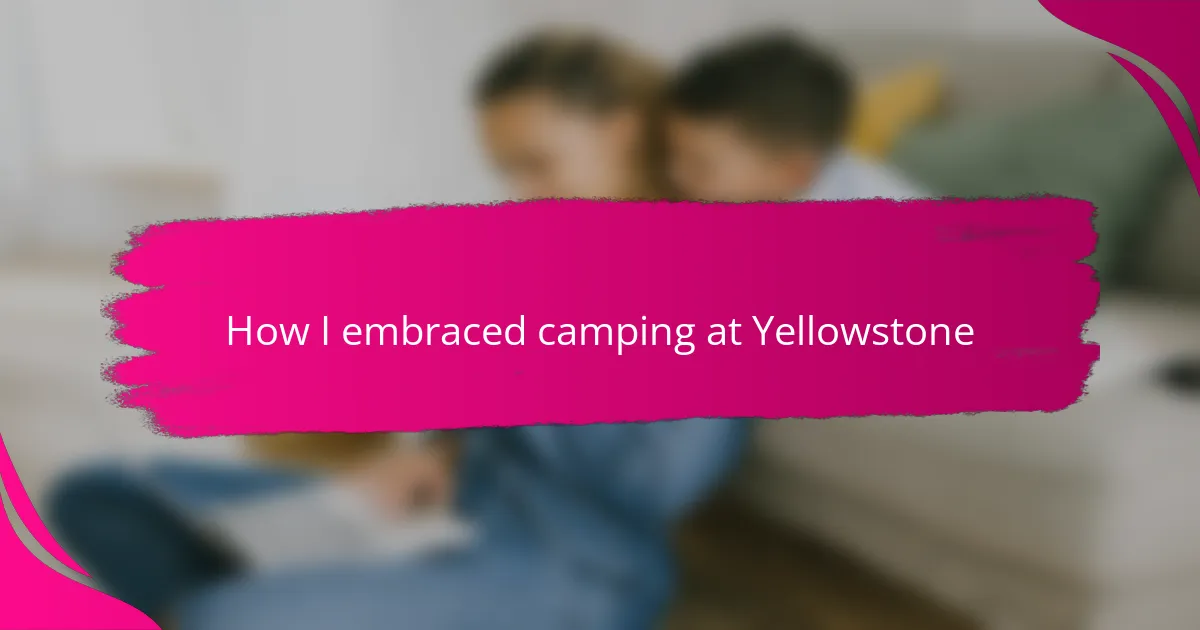Key takeaways
- Camping fosters meaningful connections between parents and children by encouraging open communication and teamwork in a relaxed environment.
- Involving kids in the camping preparation process boosts their responsibility and excitement while teaching valuable life skills.
- Engaging outdoor activities and balancing play with quiet observation enhance children’s curiosity and connection to nature.
- Challenges faced during camping trips provide valuable teaching moments, helping children develop resilience and adaptability in a supportive setting.
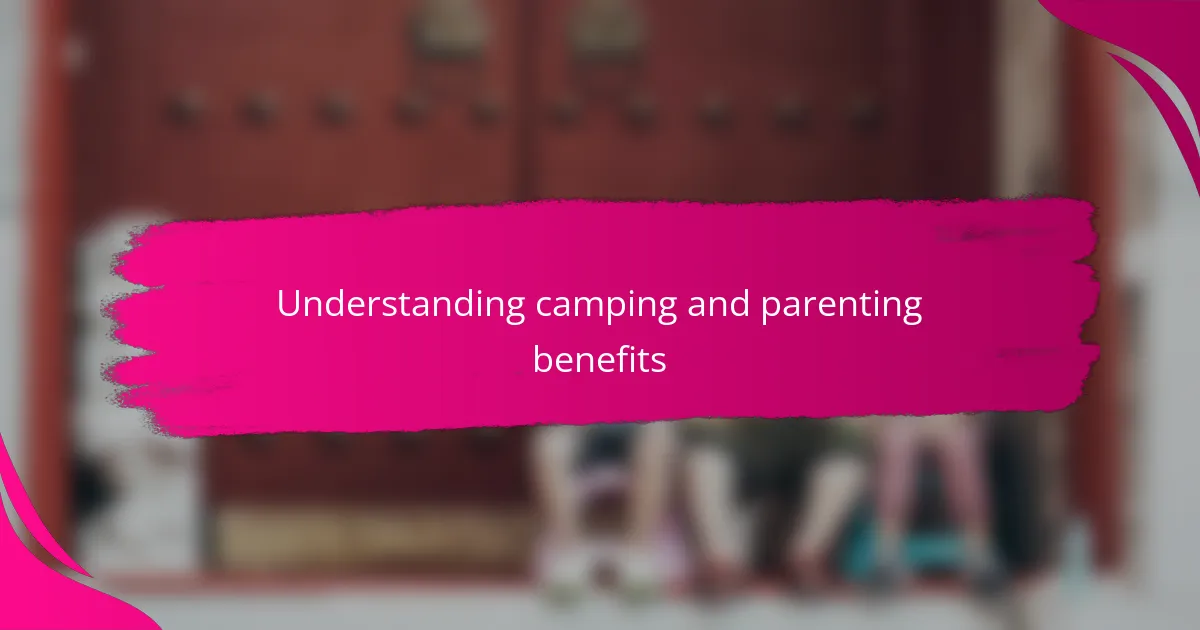
Understanding camping and parenting benefits
Camping offers more than just fresh air and nature—it creates unique opportunities for meaningful parenting. I’ve found that stepping away from screens and schedules lets my kids open up in ways they never do at home. Have you ever noticed how a simple campfire conversation can spark honesty and connection?
There’s something about the challenges of outdoor life that brings out resilience and teamwork in families. When my children figure out how to pitch a tent or navigate a trail, they gain confidence that spills over into everyday life. Isn’t it amazing how these small victories build stronger bonds and teach life skills without the pressure of a classroom?
Beyond practical lessons, camping cultivates patience and presence—for both parents and kids. I’ve learned to slow down and truly notice my children’s curiosity, from the way they watch wildlife to how they collect pinecones. In those moments, parenting feels less like a task and more like a shared adventure. Wouldn’t every parent want to experience that kind of connectedness?
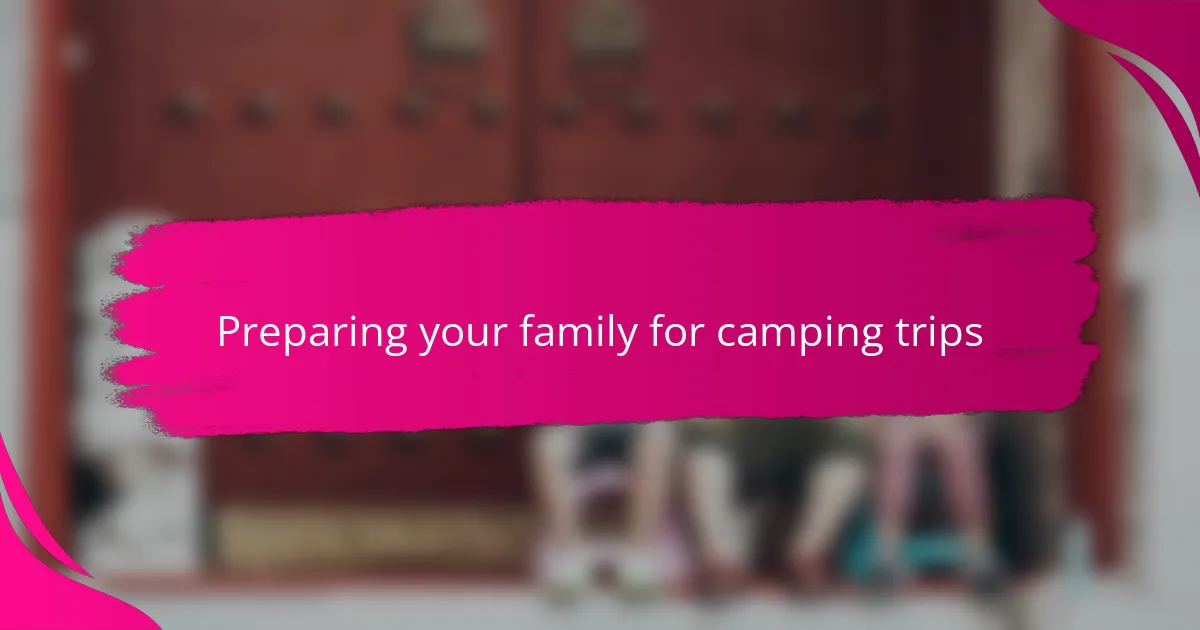
Preparing your family for camping trips
Getting ready for a family camping trip means more than packing tents and snacks—it’s about mentally preparing everyone for a new kind of adventure. I remember the first time I sat down with my kids to talk about what camping would really look like. We discussed everything from bugs to bedtime routines under the stars, which helped ease their worries and build excitement. Have you found that giving your kids a voice in the planning makes a huge difference?
Packing carefully is a skill I’ve honed over several trips. I always include a mix of essentials—warm clothes for chilly nights, beloved comfort items, and plenty of snacks to keep everyone happy. It’s a balancing act, but I’ve learned that involving the kids in choosing what to bring teaches them responsibility and makes them feel involved. Doesn’t it feel great when your family feels prepared without being overwhelmed?
Lastly, I prepare our mindset for flexibility. Camping rarely goes exactly as planned, and that’s part of the magic. When my family learned to embrace unexpected weather changes or delayed hikes, it turned potential frustration into laughter and problem-solving moments. How often do we get to practice patience and adaptability as a family in everyday life? For us, camping is that special chance.
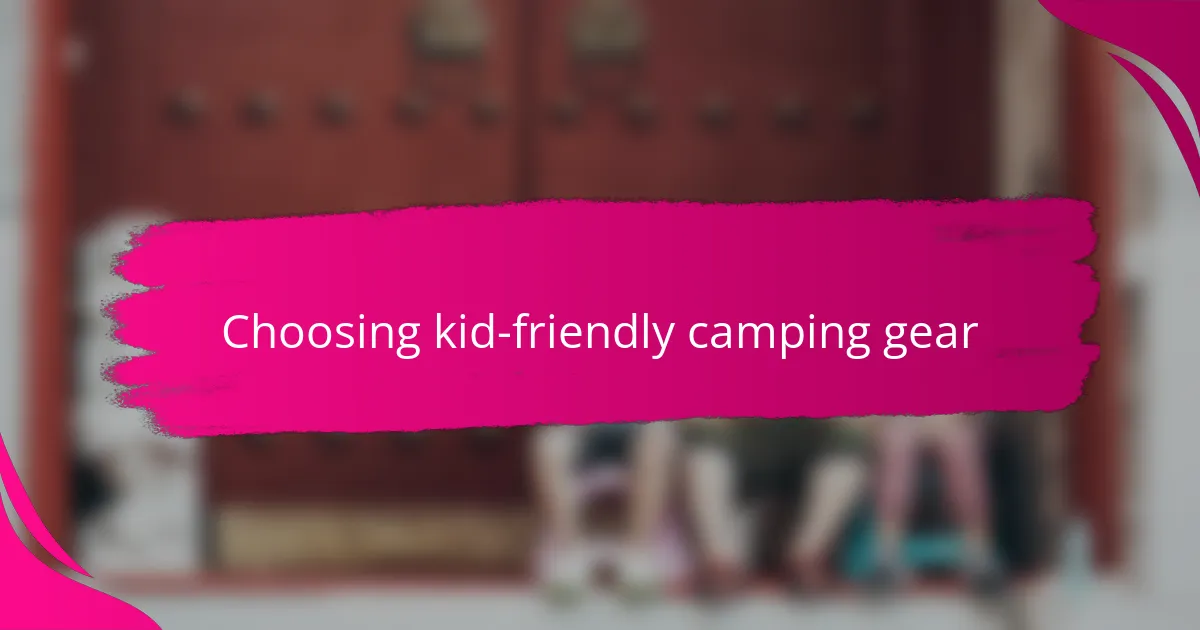
Choosing kid-friendly camping gear
Choosing kid-friendly camping gear changed my whole approach to packing for Yellowstone. Instead of just grabbing [censured]-sized tents and heavy backpacks, I looked for lightweight, colorful gear that my kids could easily handle themselves. Have you ever seen the pride on a child’s face when they carry their own little sleeping bag or set up their own mini-camp chair? It’s priceless.
I also learned that safety and comfort are non-negotiable, especially for little explorers. Soft sleeping pads, easy-to-use flashlights, and durable, spill-proof water bottles became my top picks. It’s funny how those small things made bedtime smoother and hikes less stressful—when my youngest wasn’t freezing or fumbling in the dark, the whole family relaxed.
Choosing gear isn’t just about packing necessities; it’s about empowering kids to take part in the adventure. When I let them pick a favorite hat or a fun insect-catching kit, their excitement skyrocketed. Don’t we all want our children to feel confident and excited about exploring the outdoors? From my experience, kid-friendly gear turns camping from a trip into a cherished memory.
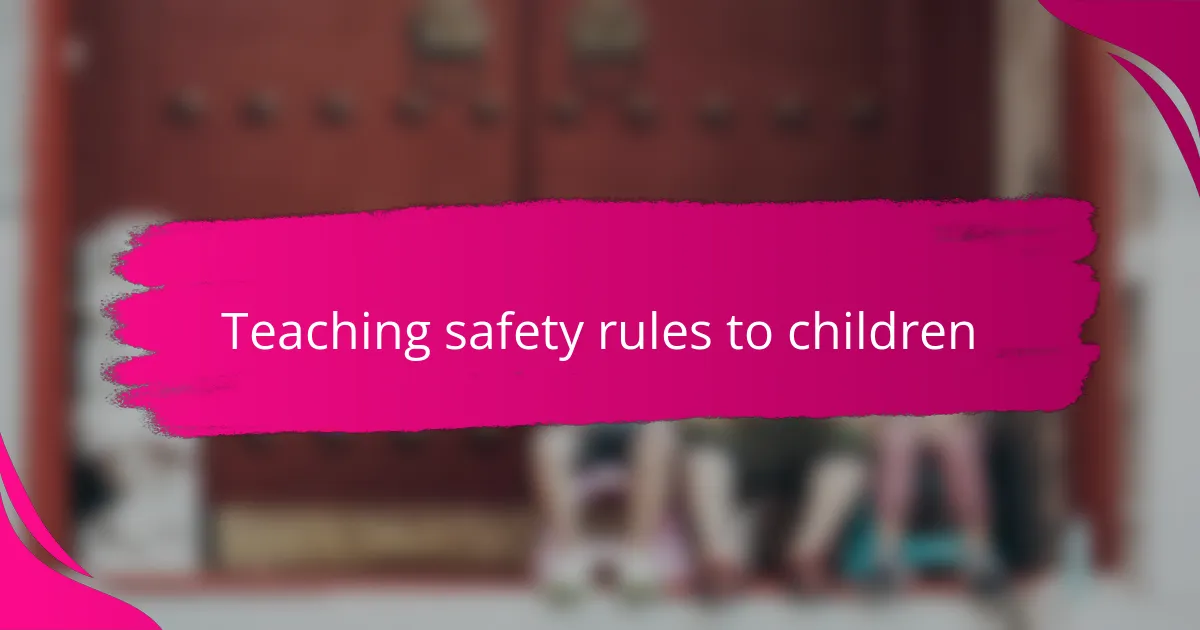
Teaching safety rules to children
Teaching safety rules to my children was one of the first things I prioritized before we even zipped up the tent. I remember sitting down with them around the campfire, explaining why we needed to stay together and keep a lookout for wildlife. Have you ever noticed how a calm, clear explanation helps kids feel secure rather than scared?
One particular moment stands out—when my youngest asked why we couldn’t touch certain plants or wander off the trail. That question led to a conversation about respecting nature and taking care of ourselves, which I realized was just as much about building trust as it was about safety. It made me appreciate how these talks teach more than rules; they foster responsibility and awareness.
I also found it important to turn safety into a game or a shared family mission. We created a “safety checklist” that the kids helped me recite each morning. Seeing them repeat things like “always carry water” or “never approach animals” made me proud, and it reminded me how engaging children in safety talks keeps them attentive. Isn’t it rewarding when learning feels like part of the adventure?
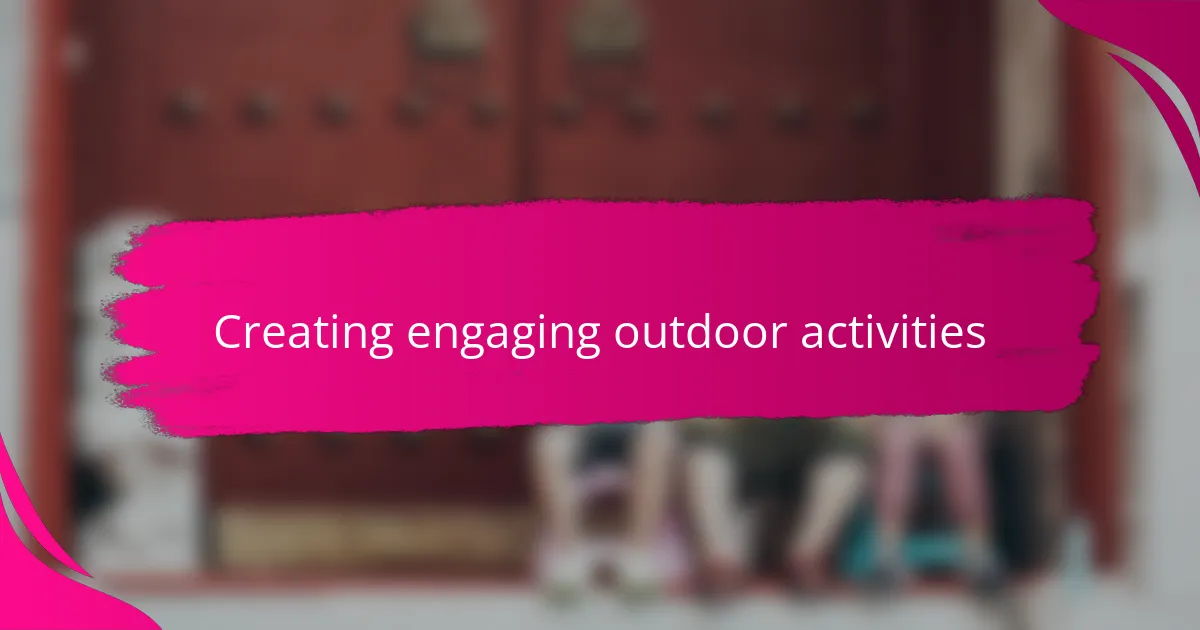
Creating engaging outdoor activities
Creating engaging outdoor activities became my secret to keeping my kids excited and curious throughout our Yellowstone camping trips. I found simple games like “nature bingo,” where we searched for different leaves, rocks, or animal tracks, turned ordinary hikes into thrilling treasure hunts. Have you ever noticed how turning exploration into play changes the whole mood of an outing?
Sometimes, I’d challenge my children to build a mini shelter using sticks and leaves, which sparked their creativity and teamwork in a way screen time never could. Watching them collaborate and problem-solve in the fresh air brought so much joy and pride—not just for them but for me as a parent too. Isn’t it wonderful when play becomes a learning experience?
I also discovered that mixing in quiet moments of observation, like sitting still to watch birds or insects, helped my kids develop patience and a real connection to nature. Those peaceful pauses were a perfect counterbalance to our active adventures. Do you find that a balance between energetic play and calm reflection makes outdoor time more meaningful? For me, it absolutely does.
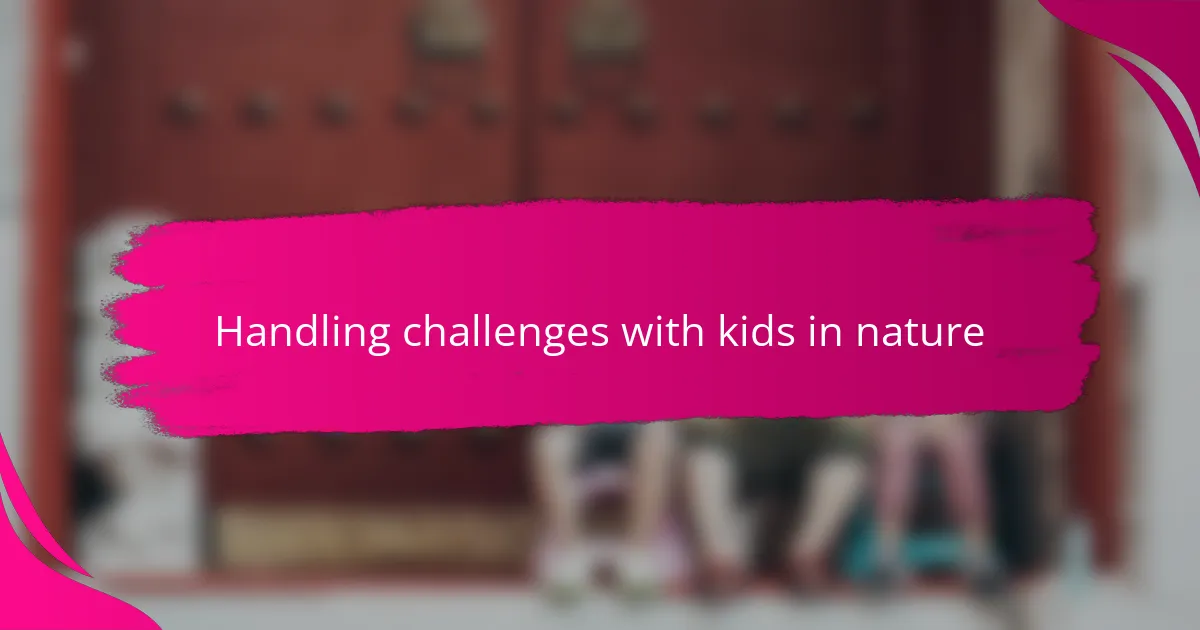
Handling challenges with kids in nature
Kids in nature often face surprises that can turn a fun day into a tough one. I remember one afternoon when my youngest suddenly panicked over a swarm of mosquitoes—it took patience and distraction to ease his fear. Have you found that staying calm and validating their feelings turns challenges into teaching moments?
Sometimes, tiredness or hunger leads to unexpected meltdowns that no parent wants in the middle of a trail. Packing extra snacks and planning breaks became my go-to strategy to nip grumpiness in the bud. Isn’t it amazing how small preparations can prevent big stress for everyone?
I also learned that flexibility is key—when the weather changed or plans shifted, keeping a positive attitude helped my kids adapt without frustration. How often do we get to practice patience and resilience together in everyday life? Nature offers those lessons, if we let it.
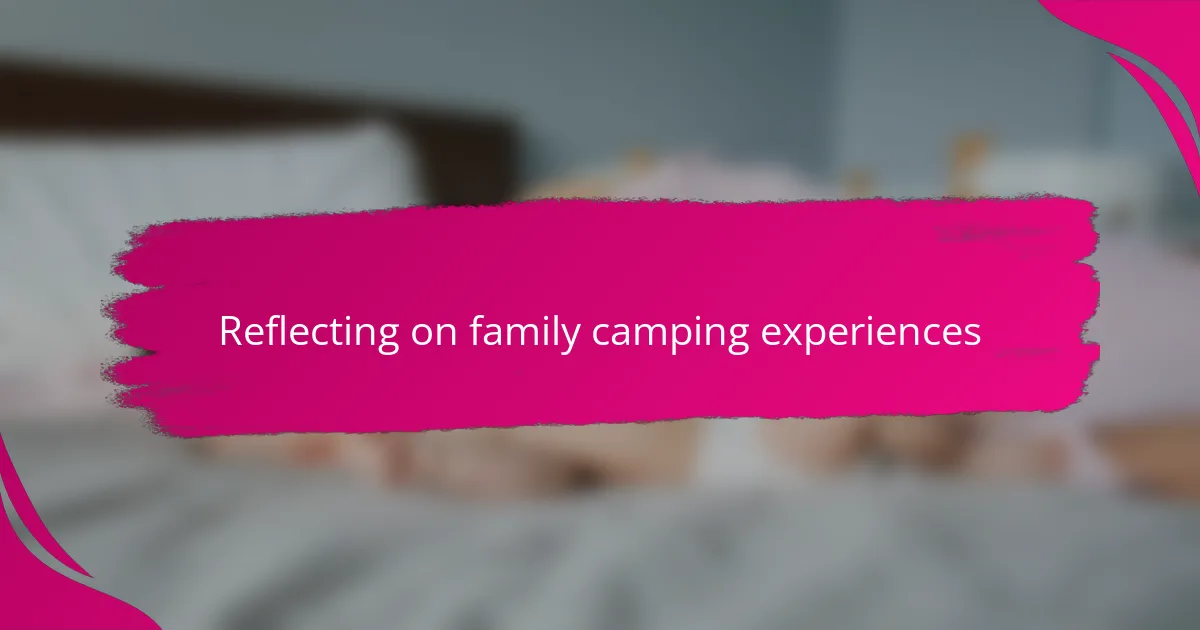
Reflecting on family camping experiences
Looking back on our family camping trips, I realize how much those moments under the open sky shaped our relationships. One evening at Yellowstone, as we gathered around the flickering campfire, the kids shared stories and laughter that felt more genuine than any daily conversation at home. Have you ever noticed how the quiet of nature invites deeper connections that the noise of everyday life often drowns out?
I also find myself reflecting on the little challenges we faced together—forgotten gear, sudden rain showers, or a detour on the trail. Each hiccup became a story to laugh about later and a lesson in teamwork. Those shared experiences, sometimes messy and unexpected, made our family bond stronger than any perfectly planned outing ever could. Doesn’t it surprise you how imperfection often creates the best memories?
Sometimes, the reflection is bittersweet. Watching my children grow from cautious beginners to confident little explorers fills me with both pride and nostalgia. I wonder if these camping adventures planted seeds of curiosity and resilience that they’ll carry into adulthood. How often do we pause to appreciate these fleeting moments before they slip quietly away?
